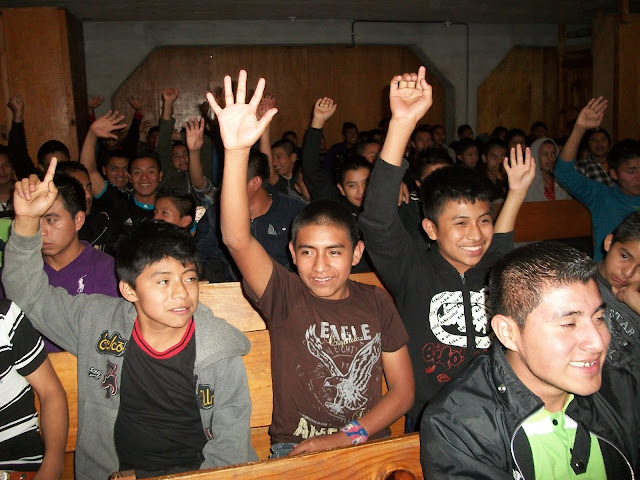One of
Julio's goals has been to plant an acre of bananas to be cultivated
intensively (fertilized and pruned regularly). Traditionally, bananas are left to grow as they please. Yields are small because of this. I did some research on
growing bananas and we started digging.
 |
| Some of the newly planted bananas. |
Part of that research involved visiting a commercial banana plantation. I was
hoping to visit a banana plantation during my year in Guatemala. I was
able to do that two weeks ago along with John Cahill. We toured banana
fields near Quirigua, which features some impressive Maya ruins smack in the
middle of a 20,000 acre Del Monte banana plantation. The road to the Maya
preserve allowed us to get to see fields that would likely have been closed to public otherwise. We snuck through the jungle of bananas, noting how
they were pruned and the cable system used to transport bananas from the field
to the processing center. We passed time with some of the field workers,
learning what it is like to be a laborer in a banana plantation and gleaning as
much information out of the agronomist as possible.
 |
| Bananas as far as the eye can see... |
Though I
have problems with farming as a monoculture, believe the labor practices used are unjust and dislike the Cavendish cultivar,
I do find the regular pruning schedule interesting. I am hoping banana
pruning is implemented at Bezaleel in the future.
 |
| Banano de oro! |
 |
| Ripe Plantains! |
 |
La manzanita!
I do not think I will ever want to eat a Cavendish again! |
On the farm:
 |
| Andres, Jose and Minor from Cuarto P. C. planting cabbages. |
The
vegetable gardens have expanded. We have made many new raised beds all over the farm and have seeded
cilantro, carrots, beets, chard and radishes wholesale.
 |
| Back (left to right): Ronald, Isaias, Marcos and Antonio. Front: Cristobal and Hector. |
 |
| All seeded and ready to grow! |
Nonetheless,
I am learning how difficult it is to raise vegetables at Bezaleel. Due to
years of slash, burn and corn, the soil is so degraded that nothing grows well,
except for crabgrass, a sign of biologically and nutritionally
deficient soil.
Yet, even
when I get past the hurdle of producing a crop, it has a slim chance of
reaching the students' stomachs. These past few months I have carried
carrots, cabbage, broccoli, onions, chili, radishes and red beets into the
kitchen. Then in about 3 weeks, I carry the shriveled remains of those
vegetables back out to feed to the pigs. The onions and chili are used
and eaten, but the rest that actually makes it into the pot, mainly cabbage and
broccoli, is often not eaten by the students. Broccoli is prepared as a
soup - overly cooked mushy broccoli in a weak broth that all the students detest.
As a result, most is thrown out. All the students I questioned want
to eat broccoli with scrambled eggs and tomato sauce, a dish that I would agree
is much more palatable. Oscar the janitor joked with me, "You can
tell all those at home that you grew nice vegetable salads for the
pigs!"
 |
| Gathering radishes with Julio and Cristobal from Quinto. |
 |
| Washing them up. |
 |
| With Lemon juice and salt, it was really quite tasty. |
Julio was
not pleased with the food waste and brought the matter up at the most recent
"directive meeting". As a result, vegetable use has
stepped up a tad. Carrots were added to the potato soup and chicken caldo
this past month. Unfortunately, the radish salad that I worked with
the students to prepare practically all went to the pigs. I probably made
way too much salad for one day. Also, the students have only 1 dish, a
bowl. So adding radish salad to your soup is not a particularly
attractive combination. Yet, rather than refrigerating the salad so it
would keep for the next day, it was left out in the hot kitchen to turn into a
pungent mushy brew. The pigs ate it with gusto however.

I tried
to prepare another salad, but Julio and the pastors reasoned,
"The students did not eat them the last time, so it is better
we sell them." As anywhere else, introducing a new concept takes
time for it to be adopted. Eating vegetables is not common in the
traditional culture here, so it will take time to introduce a new
idea. I believe a school needs to be a step ahead of traditional
cultural practices, upholding those traditions that are beneficial, but
tactfully challenging ones that are not by introducing new innovative ideas.
However, if a school has not learned those lessons yet, how can it teach?
 |
| View of the gardens from on high. |

































